23.2.4.5.6 (23 > 47)
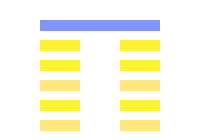
23.2.4.5.6 (23 > 47) - THE PO HEXAGRAM
- 2. The second line, divided, shows one overthrowing the couch by injuring its frame. (The injury will go on to) the destruction of (all) firm correctness, and there will be evil.
- 4. The fourth line, divided, shows its subject having overthrown the couch, and (going to injure) the skin (of him who lies on it). There will be evil.
- 5. The fifth line, divided, shows (its subject leading on the others like) a string of fishes, and (obtaining for them) the favour that lights on the inmates of the palace. There will be advantage in every way.
- 6. The topmost line, undivided, shows its subject (as) a great fruit which has not been eaten. The superior man finds (the people again) as a chariot carrying him. The small men (by their course) overthrow their own dwellings.
23.2.4.5.6 (23 > 47) - Avoiding cramming
One revises one's lessons without taking care of the subject that will be proposed.
Bing DeepL Google Yandex23.2.4.5.6 (23 > 47) - Avoiding cramming
One revises one's lessons without taking care of the subject that will be proposed.
Bing DeepL Google Yandex23.2.4.5.6 (23 > 47) - Poh, l’écroulement
Poh : opprimer, renverser, traiter durement.
-
2. [i]Id. (Poh)[i], renverser son lit en en brisant la forme ; ruine, issue destructive. C’est celui qui se perd lui-même en perdant ses auxiliaires ; un roi, ses ministres ; un grand, ses employés et amis. (Dicton.)
Il n’aura pas de compagnons.
C’est la ruine s’étendant, gagnant le haut. -
4. Renverser son lit en s’écorchant, en se nuisant à soi-même, destruction certaine, calamité proche.
Suite de la gradation, en renversant on se blesse -
5. Le prince généreux envers les gens du palais (litt.(/i] : qui enfile des poissons pour en faire présent), en retirera des avantages certains.
Peut-être devrait-on admettre déjà ici l’élément figuratif et symbolique, et voir dans l’hexagramme la figure du prince (ligne pleine supérieure) au-dessus de ses officiers rangés comme des poissons séchés et traduire : avoir des officiers comme des poissons enfilés. Alors, il s’agirait de [i]p’o, gens du palais. -
6. Fruit tout formé qu’on ne mange pas (bien acquis qui se détruit). Le sage, l’homme supérieur conquiert la terre (ou acquiert un char, le peuple qui le porte sur ses bras) ; l’homme bas et vulgaire fait crouler (poh) jusqu’à sa demeure (le fruit formé qu’il ne peut manger).
Il ne pourra plus en user.
23.2.4.5.6 (23 > 47) - Éviter le bachotage
On révise ses leçons sans prendre garde au sujet qui sera proposé.
Bing DeepL Google Yandex23.2.4.5.6 (23 > 47) - Lepusztulás
- 2. Támasz, amire nem lehet számítani többé.
- 4. Nem akar elviselni többé.
- 5. Látja mi nem működik.
- 6. Elfogadja a veszteséget. Támogatást és lehetőséget kap.
The trigrams
The trigrams are combinations of three yin and yang lines. The three bottom lines of the hexagram form the lower trigram and represent the inner situation. The three top lines form the upper trigram and represent the outer situation.
Upper trigram: The mountain The lake


Lower trigram: The earth The water


The formation: 23
What is already there

23 - THE PO HEXAGRAM
Po indicates that (in the state which it symbolizes) it will not be advantageous to make a movement in any direction whatever.
Bing DeepL Google Yandex23 - Poh, l’écroulement
Poh : opprimer, renverser, traiter durement.
Texte
Traiter durement ne réussit en rien.
Symbolisme
Montagne (pesant) sur la terre figure l’oppression. C’est aussi le grand affermissant le petit pour donner sécurité à son propre domaine. (Quand les sujets sont en sécurité, ils travaillent, restent en paix et font prospérer le domaine.)
Commentaire
Poh, renverser, abattre. Le petit (parfois) renverse le fort ; l’homme vulgaire grandit. On cède devant lui, mais on cherche à l’arrêter.
Considérant la forme du koua, le sage fait une attention particulière aux successions d’accroissement et de décroissance des êtres, de plénitude et de dépouillement (vide), — semblables aux mouvements du ciel (tels que l’hiver succédant à l’été, la nuit au jour, etc.).
23 - Lepusztulás
Hanyatlás, amit a tartalékok beosztásával lehet hátráltatni.
Bing DeepL Google Yandex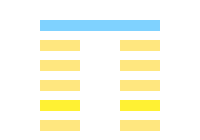
23.2 (23 > 4) - THE PO HEXAGRAM
The second line, divided, shows one overthrowing the couch by injuring its frame. (The injury will go on to) the destruction of (all) firm correctness, and there will be evil.
Bing DeepL Google Yandex23.2 (23 > 4) - Poh, l’écroulement
Poh : opprimer, renverser, traiter durement.
[i]Id. (Poh)[i], renverser son lit en en brisant la forme ; ruine, issue destructive. C’est celui qui se perd lui-même en perdant ses auxiliaires ; un roi, ses ministres ; un grand, ses employés et amis. (Dicton.)
Il n’aura pas de compagnons.
C’est la ruine s’étendant, gagnant le haut.
23.2 (23 > 4) - Casser les pieds
Soutien que l'on ne peut pas user davantage.
Bing DeepL Google Yandex
23.4 (23 > 35) - THE PO HEXAGRAM
The fourth line, divided, shows its subject having overthrown the couch, and (going to injure) the skin (of him who lies on it). There will be evil.
Bing DeepL Google Yandex23.4 (23 > 35) - Poh, l’écroulement
Poh : opprimer, renverser, traiter durement.
Renverser son lit en s’écorchant, en se nuisant à soi-même, destruction certaine, calamité proche.
Suite de la gradation, en renversant on se blesse
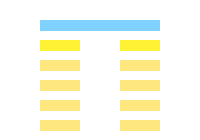
23.5 (23 > 20) - THE PO HEXAGRAM
The fifth line, divided, shows (its subject leading on the others like) a string of fishes, and (obtaining for them) the favour that lights on the inmates of the palace. There will be advantage in every way.
Bing DeepL Google Yandex23.5 (23 > 20) - Poh, l’écroulement
Poh : opprimer, renverser, traiter durement.
Le prince généreux envers les gens du palais (litt.(/i] : qui enfile des poissons pour en faire présent), en retirera des avantages certains.
Peut-être devrait-on admettre déjà ici l’élément figuratif et symbolique, et voir dans l’hexagramme la figure du prince (ligne pleine supérieure) au-dessus de ses officiers rangés comme des poissons séchés et traduire : avoir des officiers comme des poissons enfilés. Alors, il s’agirait de [i]p’o, gens du palais.

23.6 (23 > 2) - THE PO HEXAGRAM
The topmost line, undivided, shows its subject (as) a great fruit which has not been eaten. The superior man finds (the people again) as a chariot carrying him. The small men (by their course) overthrow their own dwellings.
Bing DeepL Google Yandex23.6 (23 > 2) - Choosing to leave
One accepts the rupture. One will obtain supports and means of action.
Bing DeepL Google Yandex23.6 (23 > 2) - Choosing to leave
One accepts the rupture. One will obtain supports and means of action.
Bing DeepL Google Yandex23.6 (23 > 2) - Poh, l’écroulement
Poh : opprimer, renverser, traiter durement.
Fruit tout formé qu’on ne mange pas (bien acquis qui se détruit). Le sage, l’homme supérieur conquiert la terre (ou acquiert un char, le peuple qui le porte sur ses bras) ; l’homme bas et vulgaire fait crouler (poh) jusqu’à sa demeure (le fruit formé qu’il ne peut manger).
Il ne pourra plus en user.
23.6 (23 > 2) - Préférer partir
On accepte la rupture. On obtiendra des soutiens et des moyens d'action.
Bing DeepL Google Yandex23.6 (23 > 2) - Lepusztulás
Elfogadja a veszteséget. Támogatást és lehetőséget kap.
Bing DeepL Google YandexIn the making: 47
What is poised to happen
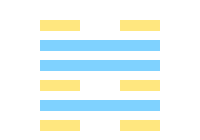
47 - THE KHWĂN HEXAGRAM.
In (the condition denoted by) Khwăn there may (yet be) progress and success. For the firm and correct, the (really) great man, there will be good fortune. He will fall into no error. If he make speeches, his words cannot be made good.
Bing DeepL Google Yandex47 - The embarrassment
Circumstances or appearances play against one. Justifying oneself is useless, one will be understood later.
Bing DeepL Google Yandex47 - The embarrassment
Circumstances or appearances play against one. Justifying oneself is useless, one will be understood later.
Bing DeepL Google Yandex47 - K’uán, la détresse
K’uán : détresse, abattement, dureté, sévérité, mauvais traitements.
K’uan « détresse, abattement (dureté, sévérité) ». Celui qui, dans le danger, ne perd pas son principe de développement et qui en détresse même est encore calme et content, c’est l’homme vraiment grand (kiun tzè). Mais d’abord il peut commettre quelque erreur, tomber en détresse s’il se fie à toute parole ; qu’il ne le fasse pas, car la parole est peu sûre.
Texte
Droit et ferme, le grand homme sera heureux. Qu’il ne se fie pas à tout ce qu’on lui dit. — K’uán est le fort saisi, emprisonné, en détresse.
Symbolisme
Marais sans eau, cela figure la détresse. — Le sage expose même sa vie pour atteindre son but.
Commentaire
K’uán est celui qui est dans la détresse, le danger. Si alors même, il ne perd pas sa grandeur d’âme, c’est vraiment un grand homme. L’homme grand prospère s’il reste fermement vertueux. Mais qu’il ne se fie pas aux dires ; les estimer hautement, c’est s’exposer à sa perte.
47 - La gêne
Les circonstances ou les apparences jouent en notre défaveur. Se justifier est inutile, on sera compris plus tard.
Bing DeepL Google Yandex47 - Kényelmetlenség
A körülmények vagy a kinézet negatív szerepet játszik. Magyarázni felesleges, később meg fogjuk érteni.
Bing DeepL Google YandexThe nuclear hexagram: 2.1.3.5.6 (2 > 37)
The nuclear hexagram is the association of the two inner trigrams (lines 2,3,4 and 3,4,5). It represents the root, or the origin of the situation.
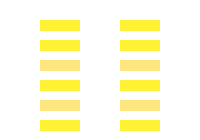
2.1.3.5.6 (2 > 37) - THE KHWĂN HEXAGRAM
- 1. In the first line, divided, (we see its subject) treading on hoarfrost. The strong ice will come (by and by).
- 3. The third line, divided, (shows its subject) keeping his excellence under restraint, but firmly maintaining it. If he should have occasion to engage in the king's service, though he will not claim the success (for himself), he will bring affairs to a good issue.
- 5. The fifth line, divided, (shows) the yellow lower garment. There will be great good fortune.
- 6. The sixth line, divided (shows) dragons fighting in the wild. Their blood is purple and yellow.
2.1.3.5.6 (2 > 37) - Obedience
One spends time with their loved ones to show them beautiful things.
Bing DeepL Google Yandex2.1.3.5.6 (2 > 37) - Obedience
One spends time with their loved ones to show them beautiful things.
Bing DeepL Google Yandex2.1.3.5.6 (2 > 37) - Kwūn, la réceptivité
Kwūn : a) Principe passif, réceptif. 1. Terre étendue et portant ; 2. Femme, femelle ; 3. Soumission, complaisance ; 4. Support, appui. — b) Kwun, fermer, lier. c) Kwun : vêtement impérial.
-
1. Quand on marche sur le verglas, c’est que la forte gelée arrive à son point extrême.
Cette phrase est une expression consacrée, peignant l’arrivée de l’hiver et le commencement des gelées. D’après la cosmologie chinoise, c’est le moment où le principe passif, réceptif, entre en action, commence à dominer et produit le fort hiver qui est son triomphe. — « Marcher sur le verglas » signifie aussi marcher avec prudence. — Le principe passif va ainsi du verglas à la glace. La forte gelée commençant par un fin verglas est aussi le type du principe producteur terrestre qui commence par l’atome pour produire les plus grands corps. Nous avons donc en cette phrase la plus forte expression du principe Kwūn, objet de la section.
Lorsque le principe passif commence la période de froid, suivant son cours naturel, il en vient aux fortes gelées. -
3. Celui qui maintient les lois (du ciel et de la terre) peut espérer le succès. Quand on s’applique au service du prince, si on ne le fait pas parfaitement, on devra le quitter. Bien qu’on ne le fasse pas d’abord parfaitement, on pourra réussir à la fin.
Il brillera à l’occasion. Savoir se conduire est glorieux et grand.
Note. (Ceci se rapporte au sens : soumission, docilité.) -
5. Kwun, vêtement impérial. Ou « vêtement de dessous jaune ». Figure de la terre qui est jaune et sous le ciel.
La beauté, le bel arrangement est en elle (et se montre au-dehors).
Le texte ajoute : Honneur, bonheur suprême. -
6. Le dragon combat dans l’espace ; son sang est noirâtre et jaunâtre. (Reprise du koua précédent : le principe actif lutte dans l’immensité pour produire ; il produit le ciel qui est noirâtre et la terre qui est jaunâtre, selon la terminologie chinoise.)
(Cette phrase finale s’applique à la fois aux deux premiers koua.)
2.1.3.5.6 (2 > 37) - L'obéissance
On passe du temps avec ses proches pour leur montrer de belles choses.
Bing DeepL Google Yandex2.1.3.5.6 (2 > 37) - Engedelmesség
- 1. A korlátok áthágása miatt elcsúszik.
- 3. Feladataiban csak a szükségessel kell törődnie.
- 5. A szerénység sikerre vezet.
- 6. Meglep másokat mert kérdés nélkül cselekszik.
Ruler
The starting situation

23.6 (23 > 2) - THE PO HEXAGRAM
The topmost line, undivided, shows its subject (as) a great fruit which has not been eaten. The superior man finds (the people again) as a chariot carrying him. The small men (by their course) overthrow their own dwellings.
Bing DeepL Google Yandex23.6 (23 > 2) - Choosing to leave
One accepts the rupture. One will obtain supports and means of action.
Bing DeepL Google Yandex23.6 (23 > 2) - Choosing to leave
One accepts the rupture. One will obtain supports and means of action.
Bing DeepL Google Yandex23.6 (23 > 2) - Poh, l’écroulement
Poh : opprimer, renverser, traiter durement.
Fruit tout formé qu’on ne mange pas (bien acquis qui se détruit). Le sage, l’homme supérieur conquiert la terre (ou acquiert un char, le peuple qui le porte sur ses bras) ; l’homme bas et vulgaire fait crouler (poh) jusqu’à sa demeure (le fruit formé qu’il ne peut manger).
Il ne pourra plus en user.
23.6 (23 > 2) - Préférer partir
On accepte la rupture. On obtiendra des soutiens et des moyens d'action.
Bing DeepL Google Yandex23.6 (23 > 2) - Lepusztulás
Elfogadja a veszteséget. Támogatást és lehetőséget kap.
Bing DeepL Google YandexCorrection
The direction where the ruler is going to bend
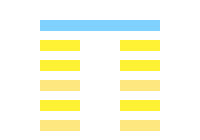
23.2.4.5 (23 > 6) - THE PO HEXAGRAM
- 2. The second line, divided, shows one overthrowing the couch by injuring its frame. (The injury will go on to) the destruction of (all) firm correctness, and there will be evil.
- 4. The fourth line, divided, shows its subject having overthrown the couch, and (going to injure) the skin (of him who lies on it). There will be evil.
- 5. The fifth line, divided, shows (its subject leading on the others like) a string of fishes, and (obtaining for them) the favour that lights on the inmates of the palace. There will be advantage in every way.
23.2.4.5 (23 > 6) - Not recognising legitimacy
One can tell others that they have lost their last supports.
Bing DeepL Google Yandex23.2.4.5 (23 > 6) - Not recognizing legitimacy
One can tell others that they have lost their last supports.
Bing DeepL Google Yandex23.2.4.5 (23 > 6) - Poh, l’écroulement
Poh : opprimer, renverser, traiter durement.
-
2. [i]Id. (Poh)[i], renverser son lit en en brisant la forme ; ruine, issue destructive. C’est celui qui se perd lui-même en perdant ses auxiliaires ; un roi, ses ministres ; un grand, ses employés et amis. (Dicton.)
Il n’aura pas de compagnons.
C’est la ruine s’étendant, gagnant le haut. -
4. Renverser son lit en s’écorchant, en se nuisant à soi-même, destruction certaine, calamité proche.
Suite de la gradation, en renversant on se blesse -
5. Le prince généreux envers les gens du palais (litt.(/i] : qui enfile des poissons pour en faire présent), en retirera des avantages certains.
Peut-être devrait-on admettre déjà ici l’élément figuratif et symbolique, et voir dans l’hexagramme la figure du prince (ligne pleine supérieure) au-dessus de ses officiers rangés comme des poissons séchés et traduire : avoir des officiers comme des poissons enfilés. Alors, il s’agirait de [i]p’o, gens du palais.
23.2.4.5 (23 > 6) - Ne pas reconnaître la légitimité
On peut dire aux autres qu'ils ont perdu leurs derniers soutiens.
Bing DeepL Google Yandex23.2.4.5 (23 > 6) - Lepusztulás
- 2. Támasz, amire nem lehet számítani többé.
- 4. Nem akar elviselni többé.
- 5. Látja mi nem működik.

